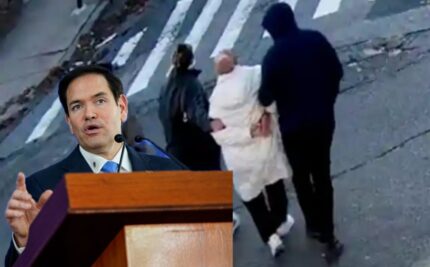United States Secretary of State Marco Rubio has announced that the US government has revoked at least 300 foreign student visas as part of President Donald Trump’s crackdown on pro-Palestinian demonstrations on university campuses. Marco Rubio made the statement during a visit to Guyana, emphasizing that the administration is taking decisive action against students involved in campus activism deemed anti-Israel.
“Maybe more than 300 at this point,” Marco Rubio told reporters. “We do it every day, every time I find one of these lunatics.” The move is part of a broader effort by the Trump administration to curb protests that officials argue contribute to antisemitism and campus unrest. However, critics argue that these actions violate civil liberties and suppress free speech.
Arrest of Turkish Student Sparks Outrage
One of the most high-profile cases in this crackdown involves Rumeysa Ozturk, a Turkish doctoral student at Tufts University. Ozturk, a Fulbright Scholar studying Child Study and Human Development, was detained by plain-clothes immigration officers outside her home in Boston, Massachusetts. A viral video showed masked agents escorting her into an unmarked car, sparking widespread protests online.
Despite the arrest, it remains unclear whether Ozturk has been formally charged. Her lawyer, Mahsa Khanbabai, stated that Ozturk was likely targeted for her participation in pro-Palestinian protests and for co-authoring a student newspaper article urging Tufts University to divest from companies linked to Israel. “Based on patterns we are seeing across the country, her exercising her free speech rights appears to have played a role in her detention,” Khanbabai said.
Marco Rubio Defends Visa Revocations
When asked about Ozturk’s arrest and the broader crackdown, Rubio defended the administration’s actions. “If you apply for a student visa to come to the United States and you say you’re coming not just to study, but to participate in movements that vandalize universities, harass students, take over buildings, and cause chaos, we’re not giving you that visa,” Rubio stated.
Marco Rubio’s comments suggest that foreign students involved in protests may now be considered a threat to national security. Under the Immigration and Nationality Act, the State Department can revoke visas and deport non-citizens deemed “adversarial to the foreign policy and national security interests” of the US. The Trump administration has used this legal provision to justify its actions, with Marco Rubio reaffirming, “We give students visas to earn a degree, not to become social activists tearing up our campuses.”
Legal and Political Repercussions
The detentions and visa revocations have drawn criticism from legal experts and politicians. Senator Elizabeth Warren condemned the move, stating, “The Trump administration is targeting students with legal status and ripping people out of their communities without due process. This is an attack on our Constitution and basic freedoms—and we will push back.”
In a separate case, a federal judge in Massachusetts ordered the government to provide further information on Ozturk’s detention by Friday. Meanwhile, another judge recently blocked the deportation of Yunseo Chung, a 21-year-old Columbia University student and legal permanent resident originally from South Korea. These rulings indicate that the administration’s actions may face legal challenges.
A Growing Crackdown on Campus Protests
The visa revocations are part of a broader policy shift under the Trump administration, which has sought to penalize universities perceived as tolerating antisemitic rhetoric. Earlier this year, the White House revoked $400 million in federal funding for Columbia University over its handling of campus protests. The administration has also warned other institutions that similar actions could follow if they fail to curb pro-Palestinian demonstrations.
The case of Mahmoud Khalil, a Palestinian activist and Columbia University graduate currently detained in Louisiana without charges, has further intensified concerns. Ozturk has reportedly also been transferred to a detention center in Louisiana, despite a Massachusetts judge’s order that she remain in the state.
With student protests continuing and legal battles mounting, the controversy surrounding the visa revocations is expected to escalate, raising serious questions about free speech, immigration policies, and the limits of government authority in the United States.














